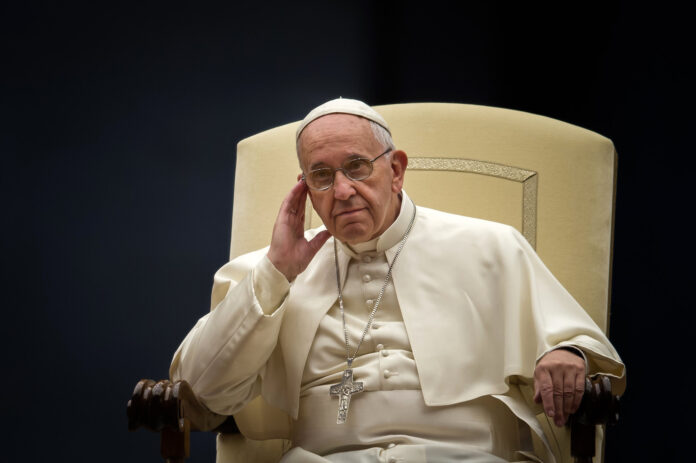For the first time since the outbreak of the pandemic, Mass was celebrated in St. Peter’s Basilica on Divine Mercy Sunday, 24 April 2022. Archbishop Rino Fisichella, the President of the Pontifical Council for Promoting the New Evangelization, presided over the Mass, which saw Pope Francis participate and deliver the homily in which he reflected on Jesus’ post-Resurrection exhortation to His disciples: “Peace be with you.”
The Pope focused on the three times Jesus spoke the words “Peace be with you” to the disciples after His death and resurrection. He said that Christians find that those words of God’s mercy “give joy, then grant forgiveness, and finally offer comfort in every difficulty.”
Filling us with joy
The first time Jesus spoke those words on the evening of Easter (John 20), said the Pope, the disciples were filled with joy.
As they huddled in fear three days after Jesus’ death, the disciples were “burdened by a sense of failure” after having abandoned their Master and even denied Him in His tragic hour.
In this condition, said Pope Francis, they should have felt shame at seeing Jesus’ face.
Yet, His greeting of peace made them turn their attention “away from themselves and towards Jesus.”
“Christ did not reproach them for what they had done, but showed them his usual kindness. And this revives them, fills their hearts with the peace they had lost, and makes them new persons, purified by a forgiveness that is utterly unmerited.”
The joy brought by Jesus, added the Pope, cuts through our own failings and helps us embrace God’s mercy and the joy of being forgiven.
Jesus offers us “a joy that raises us up without humiliating us.”
Granting us forgiveness
Pope Francis then reflected on the second time Jesus said “Peace be with you,” after which He adds “As the Father has sent me, so I send you.”
After having received God’s forgiveness, said the Pope, the disciples are made “agents of reconciliation” in order to dispense “the mercy that they themselves have received.”
“Today and every day, in the Church forgiveness must be received in this same way, through the humble goodness of a merciful confessor who sees himself not as the holder of some power but as a channel of mercy, who pours out upon others the forgiveness that he himself first received.”
Jesus, said the Pope, has made the entire Church a “community that dispenses mercy, a sign and instrument of reconciliation for all humanity.”
He added that each of us must spread God’s mercy to those around us in every situation of life.
Offering us comfort
The final time Jesus utters His peaceful greeting comes after Thomas has expressed his disbelief of Jesus’ resurrection.
Rather than rebuking him, Jesus comes to Thomas’ aid and allows him to put his finger in His side.
“He does not treat Thomas with harshness, and the apostle is deeply moved by this kindness. From a disbeliever, he becomes a believer, and makes the simplest and finest confession of faith: ‘My Lord and my God!’”
Pope Francis said that every believer can relate to Thomas’ story and disbelief. Jesus comes to us too with “heartwarming signs of His mercy” and comforts us “by offering His wounds.”
Divine Mercy opens us up to suffering of others
At the same time, said the Pope, our experience of God’s mercy helps us to see the wounds of our brothers and sisters.
“We think that we are experiencing unbearable pain and situations of suffering, and we suddenly discover that others around us are silently enduring even worse things,” he said. “If we care for the wounds of our neighbour and pour upon them the balm of mercy, we find being reborn within us a hope that comforts us in our weariness.”
In conclusion, Pope Francis urged all Christians to make Divine Mercy Sunday their own by lending a helping hand or listening ear to those around us who may be suffering.
“From the eyes of all those who are weighed down by the trials of life,” said the Pope, “He looks out at us with mercy and says once more to us: ‘Peace be with you!’”
Edited from an article in Vatican News by Devin Watkins. The complete article can be viewed here.

